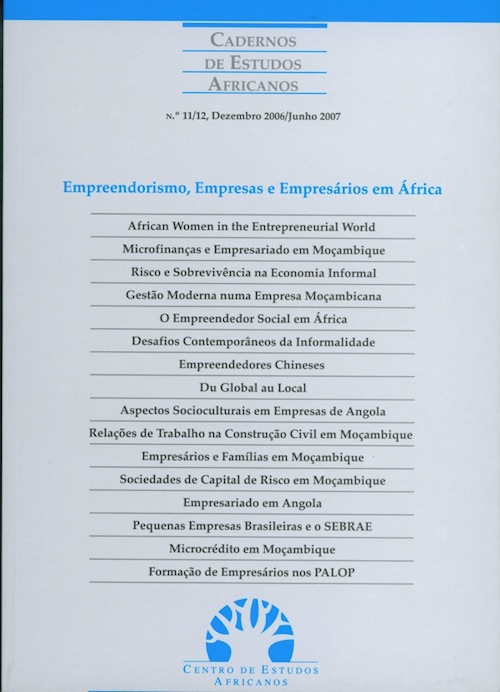Sector Informal, Microfinanças e Empresariado Nacional em Moçambique
Informal Sector, Microfinance and National Entrepreneurs in Mozambique
DOI:
https://doi.org/10.4000/cea.930Keywords:
Economia informal, Sector empresarial, Microeconomia, MoçambiqueAbstract
The informal sector has assumed a significant importance, particularly in developing economies of Africa, Latin America, and Asia. Some specialists consider its inception and flourishing as a natural reaction to the economic repression that took place in many of those countries where the state control over prices, interest and exchange rates were predominant, as well as the control over goods and services markets which, those analysts believe, limited private initiative and the free running of the markets. More recent studies, mainly in countries like Mozambique in which structural reforms are under way in the last 15 to 20 years, acknowledge that the informal sector emerges and prospers as a counterweight of the liberalization process and the opening of those economies to outside influences and foreign investment, constituting a sort of exhaust pipe through which the unemployment generated by the advent of privatisations flows and where the unemployed wait for the ripening of an endogenous process aiming at the creation of a national/local entrepreneur. As a matter of fact, operating outside the boundaries of the tax system and off the official records system, the informal sector in those countries represents however a qualitative leap in relation to the subsistence economy – where the family sector (households) produces, fundamentally, for self‑consumption and does the barter of eventual surpluses, for it is inserted on an exchange economy based on monetary‑trade relations where the financial intermediation through micro‑finance schemes, most of them also on an informal basis, plays a relevant role. The retrospective treatment of these matters, as well as the problematic analysis on the capacity of the informal sector to generate, by itself, the necessary elements in order to achieve the competitive accumulation of capital as well as the creation and consolidation of national entrepreneurs in Mozambique is the aim of this paper. It deals with the connections between the informal sector, micro‑finance, and the national entrepreneurship, in a context of growing regional integration and the internationalisation of the Mozambican economy under the winds of globalisation.
References
Aryeetey, E. (1995), «The informal financial sector», Economic Research and Policy Making in Sub‑Saharan Africa, Nairobi, African Economic Research Consortium‑AERC.
Banco Mundial (1990), África Subsaariana: da crise até ao crescimento sustentável – Estudo de uma perspectiva de longo prazo, Washington, DC.
De Abreu, António Pinto (2001), «O papel do empresariado nacional no contexto da globalização», Democracia e Desenvolvimento, Maputo, Associação Joaquim Chissano.
De Abreu, Silvina Rodrigues, e De Abreu, António Pinto (1996), «Sector informal em Moçambique: uma abordagem monetária», Staff paper, 5, Maputo, Banco de Moçambique.
Gerry, Chris (1987), «Developing economies and the informal sector in historical perspective», The Annals of the American Academy of Political and Social Science, Califórnia, Newbury Park.
DOI : 10.1177/0002716287493001008
Jamal, Lisete E. (2004), «Constraints for the extension of microfinance services to the rural areas in Mozambique: are they a real problem or a false argument?», Beira, Universidade Católica de Moçambique.
MPD (2005), Política e Estratégica Nacional de Microfinanças: Proposta Final, Maputo, Ministério da Planificação e Desenvolvimento.
Navalha, Felisberto (2000), Captação de Poupanças dentro do Sector Informal em Moçambique: O Caso do Sector Informal Financeiro em Maputo, Maputo, Universidade Eduardo Mondlane.
OIT (1991), The Dilemma of the Informal Sector, Report of the Director‑General, International Labour Conference, 78th Session, Geneva.
Sulemane, José A. (2001), Economic Decline: A Study with Reference to Mozambique, Indiana, University of Notre Dame.
Tanzi, Vito (1982), The Underground Economy in the United States and Abroad, Lexington, Mass., DC Heath and Company.
Thomas, J. J. (1993), «The informal financial sector: how does it operate and who are the customers?», Sheila Page (ed.), Monetary Policy in Developing Countries, Londres, Routledge, ODI.
Webster, Leila, e Fidler, Peter (1996), «The informal sectors of West Africa», The Informal Sector and Microfinance Institutions in West Africa, Washington, DC, World Bank.
World Bank (2002), «Building institutions for markets», Washington, DC, World Development Report 2002.
Downloads
Published
Issue
Section
License
Copyright (c) 2016 Cadernos de Estudos Africanos

This work is licensed under a Creative Commons Attribution-NonCommercial-ShareAlike 4.0 International License.
I authorize the publication of the submitted article/review of which I am the author.
I also declare that this article is original, that it has not been published in any other way, and that I exclusively assign the publication rights to the journal Cadernos de Estudos Africanos. Reproduction of the article, in whole or in part, in other publications or on other media is subject to the prior authorization of the publisher Centro de Estudos Internacionais do Iscte - Instituto Universitário de Lisboa.

